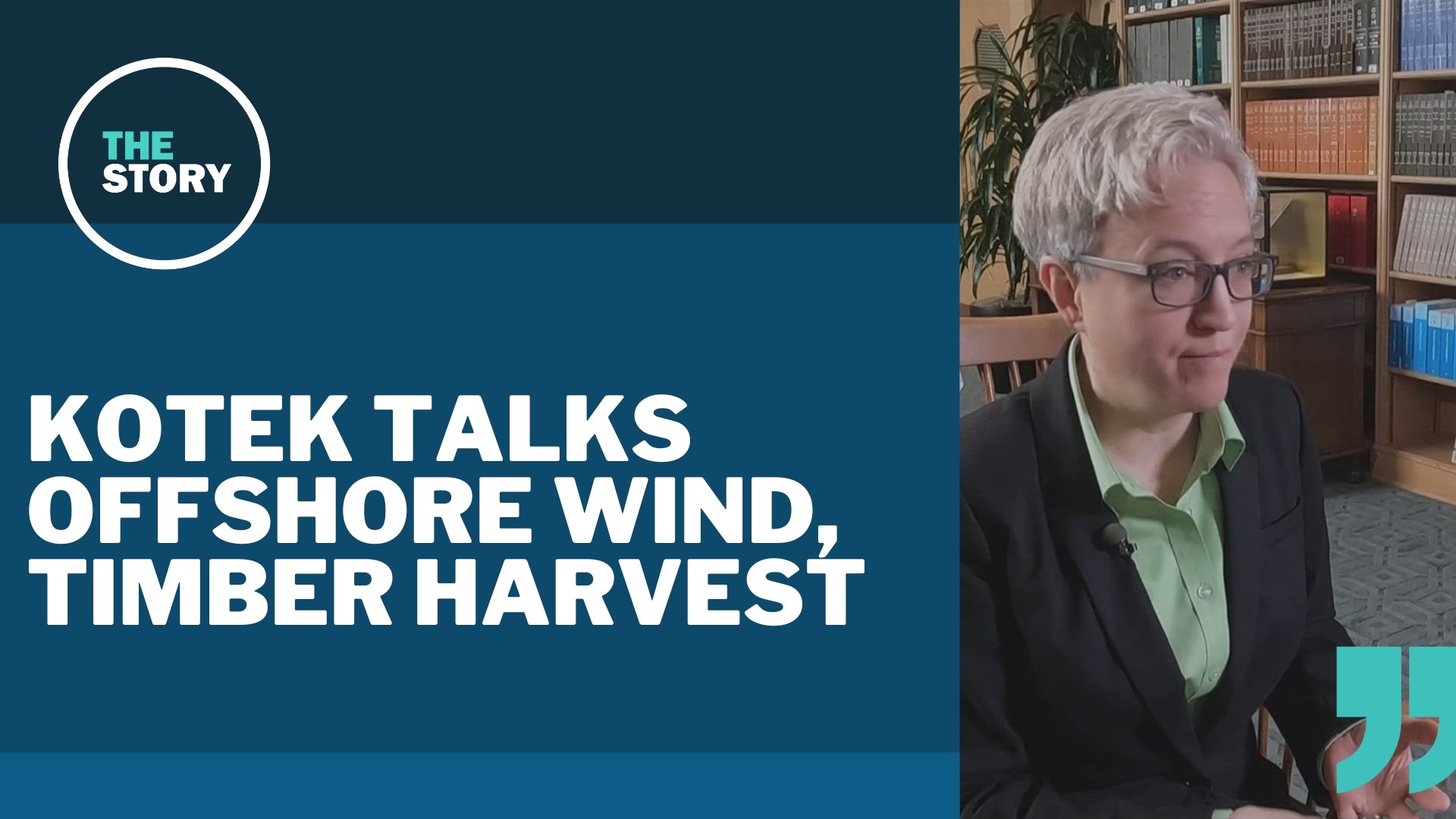SALEM, Ore. —
In the first part of KGW's exclusive interview with Oregon Gov. Tina Kotek on environmental issues, we covered the state’s climate policies, transportation and housing.
For the second part, we got into some thornier issues.
The state is taking on two challenges that have stirred up quite a bit of pushback: offshore wind development and a change to the way timber is harvested in Oregon’s western state forests, mostly in Tillamook and Clatsop counties.
Locals in both regions have registered strong opposition to the plans, and Kotek has weighed in on both in different ways.
"I'm very committed to working with the local community, so everybody gets heard," Kotek said about offshore wind development. "So if we do move forward, we do it in the right way."
Starting on the south coast, the federal Bureau of Ocean Energy Management, or BOEM, has been working to bring floating offshore wind turbines to Oregon for several years already, but is still roughly a decade from actually generating electricity.
Still, the process has left many in the area feeling unheard and excluded from the process.
Earlier this year, BOEM announced it had finalized two areas — one off the coast of Brookings, the other near Coos Bay — that would go up for auction later this year.
That announcement came after repeated calls from tribes in the area and representatives of the seafood industry to slow the process down to allow for more engagement with community members who had concerns over impacts to cultural resources and fishing grounds.
Last week, Kotek signed House Bill 4080, which would create a "roadmap" for how Oregon works to develop offshore wind in the state.
Around the same time, dozens of fishermen and seafood processors wrote to Kotek, urging her to halt the auctions before they take place later this year to give time to work on the roadmap.
"Moving the process forward with a lease auction prior to completion of the roadmap is premature and threatens the ability to consider offshore wind energy development in an equitable, holistic, and bottom-up way," the letter read. "It is not just fishermen and coastal communities that are concerned — it is environmentalists, marine scientists, local governments and citizens."
Kotek said those concerns are valid.
"I agree with local communities that this hasn't been the best process," she said. "There are concerns as Oregonians we want to address — our fishing industry, the cultural impacts related to our tribes' concerns."
She stopped short of saying she would try to halt the auction process, but left the door open for state action in the future.
"My understanding of that process is there is a lot of process that happens even after the auctions if they were to go forward," Kotek said. "We are engaging on a regular basis with the Bureau of Ocean Energy Management about what the next steps are. I am not going to let the federal government expose Oregon communities to really bad consequences."
KOTEK'S EXCLUSIVE INTERVIEW ON CLIMATE CHANGE, PART ONE: 'We want to make sure that everyone's at the table'
Farther north, the Oregon Department of Forestry is getting close to finalizing a Habitat Conservation Plan for state forests.
The plan would prohibit logging on some parts of the roughly 700,000 acres of state forests, thereby shielding the state from lawsuits over the Endangered Species Act that have plagued timber sales on state land for years.
The plan is also projected to cut timber harvests on state land between 30% and 40% from the yearly average over the last decade.
Counties like Tillamook and Clatsop, as well as smaller public safety agencies and school districts, derive a portion of revenue from timber harvests and are set to take a financial hit if the plan is ultimately approved.
"I think there are a complex set of possible consequences for the HCP," Kotek said. "I want to make sure as governor to work with local communities to try to adjust for any impacts."
Earlier this year, Kotek pledged to find state money to offset lost revenue from the plan, but folks who work in the timber industry say while that might help fund the counties, it will do little to help with jobs that could be lost.
Kotek said the Habitat Conservation Plan is just part of the equation.
"We're in a global market. We're competing globally for timber products and how logs are used," she said. "We have to have some new ideas on the table to protect Oregon so we can keep those jobs here while we're also dealing with the financial impacts of the HCP."
One idea being pushed by environmental advocates would be to decouple county funding from timber harvest completely.
It's been done before. In 2022, the State Land Board approved a plan to cut financial ties between the 91,000-acre Elliot State Forest and the Common School Fund. The forest had been logged for nearly a century with revenue flowing to education funds.
So, would Kotek be in favor of a plan like that for state forests in northwest Oregon?
"There might be a longer-term conversation out there, but right now, we're focusing on the concerns for the near term on the impacts of the HCP," Kotek said.
After being pressed for an answer, she declined to take a position on the issue, but added, "We will be wrestling with this for the next several years with the legislature about how we support our rural counties."

